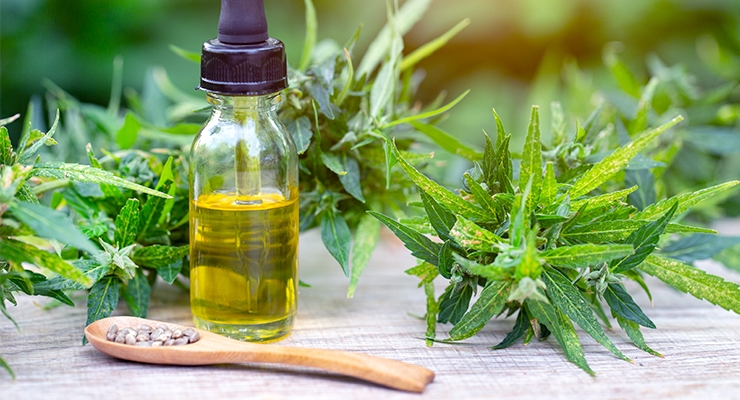Columns
Regulatory Harmonization in Europe: CBD Case Study
Despite long-standing efforts, many EU regulatory standards are still out of alignment.
By: Joerg Gruenwald

One of the advantages of doing business in the EU marketplace is the fact that business operators needn’t worry about the various Member State regulations, because the regulatory landscape is shaped at the EU level, and can be expected to be the same in every country—theoretically.
There are some areas that are still not harmonized. Much has been written and talked about with regard to the situation of health claims on botanical substances, which, due to lack of guidance from Brussels, has forced EU countries to come up with their own regulations, mostly in the shape of national plant lists. The BELFRIT list, jointly drawn up by Belgium, France, and Italy, is one example.
Another well-known issue is the fact that the only substances to be included in foods (including food supplements) that are regulated at the EU level are vitamins and minerals, for which a positive list exists (in the annex of the Food Supplement Directive 2002/46/EC). Most other substances such as amino acids, and yes, botanicals, are not regulated. (The Food For Specific Groups Regulation EU 609/2013 has another positive list in one of its annexes, and it does not regulate botanicals either.)
Interestingly, even for the vitamins and minerals that do have a positive list, maximum intake amounts are still not regulated at the EU level. And so, again, Member States have had to step in to do their own regulating by discussing and implementing their own maximum uptake amounts.
Cannabis Case Study
As for the consequences of marketing plant substances across EU markets, let’s use an example that has recently gained a lot of popularity: Cannabis.
While marijuana, which contains the psychoactive substance tetrahydrocannabinol (THC), is still not legal to market in the EU, industrial hemp (Cannabis sativa) is not subject to the EU’s narcotics legislation, since it only contains THC in very small amounts, below the 0.2% threshold set by the legislation. Its main active substance is cannabidiol (CBD), a non-psychoactive component that has several reported health benefits, among them anxiety, stress, and IBS relief. Accordingly, the potential market for CBD products derived from hemp is huge, currently estimated at around €190 million.
Just in February of this year, the European Commission (EC) classified CBD-containing industrial hemp-derived products as Novel Food. This means that retailers can legally sell CBD products as food in the EU, provided they have a pre-market approval. Up until then, CBD products were generally considered as medicinal by regulators.
Still A Patchwork
This is where things become non-harmonized again. Despite the Novel Food ruling, Austria recently decided that all products containing CBD would only be available under prescription. The MHRA in the U.K. also ruled that products containing CBD should be classified as medicines.
Belgium does not allow CBD products to be marketed under any condition. Italy, too, recently ruled that sale of all Cannabis-derived products (e.g., oils, buds, leaves, resins) are illegal and cannot be sold under any circumstances.
Germany, in contrast, while upholding the Novel Food limitation, is permitting manufacturers to cultivate Cannabis, even raising import quotas to meet demand.
Bulgaria decided to approach the decision by the European Commission differently—by issuing a Free Sales Certificate to a U.S.-based firm for its CBD products on the basis that the products can be considered as “traditional foods.” The decision is not legally binding yet, but if it is upheld, Bulgaria will be the first EU country to allow open sale of cannabidiol-containing products.
The Irish Food Safety Authority allows the sale of hemp seeds, but not of CO2-extracted CBD.
These examples demonstrate the regulatory patchwork of EU Member States, and CBD is just one ingredient. A similar situation exists for others, from amino acids to red yeast rice, and indeed for most botanicals that also have a medicinal effect.
Notification/Approval Standards
Once a food business operator has solved this, and marketability of a new product and all its ingredient is assured in the EU target market, the next step is actually bringing it to market. And this is where they will encounter the next example of European dis-harmonization, namely the matter of notification.
Germany requires no notification for products including fortified foods. The notification for food supplements is a simple online procedure with an automated receipt. The food safety authority does not review the notification. All responsibility for the product rests with the responsible party according to the product label. Foods for Specific Groups (FSG) require completion of a form that is mailed to the authority; the receipt is also mailed. Again, no review of the notification takes place.
Belgium, on the other hand, requires a notification for fortified foods as well as for food supplements and FSGs. The food safety authority does review these notifications and can deny market access for those products it finds issues with.
Austria does not require a notification for foods, fortified foods, or food supplements. The notification for an FSG consists of an informal e-mail to the food safety authority stating the bare minimum of facts with the label appended.
All these examples show that regulatory harmonization in the EU is still far from a reality. In view of this diverse landscape, food business operators should seek the advice of experienced consultancies such as a&r in case they wish to do business in more than one EU country.
Joerg Gruenwald
analyze & realize ag
Dr. Joerg Gruenwald is co-founder of analyze & realize GmbH, a specialized business consulting company and CRO in the fields of nutraceuticals, dietary supplements, herbals and functional food, and author of the PDR for Herbal Medicines. He can be reached at analyze & realize GmbH, Waldseeweg 6, 13467 Berlin, Germany; +49-30-40008100; E-mail: jgruenwald@a-r.com;
Website: www.analyze-realize.com.


